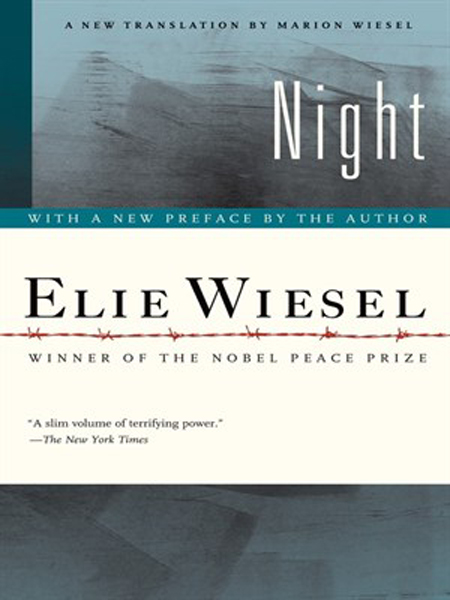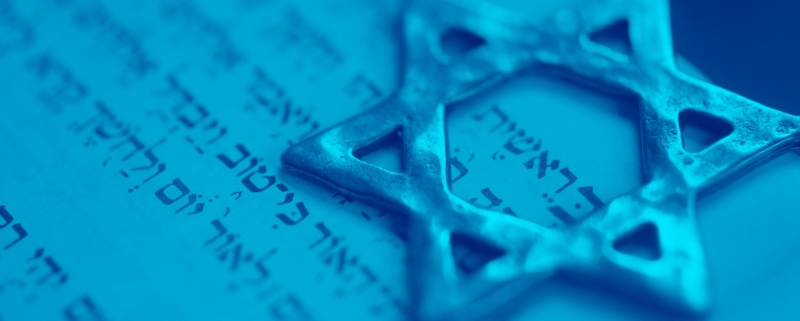
About the Author:
Eliezar Wiesel was born in 1928 in the small Hungarian village of Sighet, in what is today Romania. Like so many boys of his time, Elie began religious studies at an early age and spent his childhood studying Judaism, especially enjoying learning about the Jewish mystical tradition and Chasidic folktales. His father encouraged him to also study modern Hebrew and secular subjects. During this time, Elie developed his strong belief in God and deep connection to the Jewish people.
At fifteen his faith was shaken when his entire village was deported to Nazi concentration camps. In Auschwitz, Elie was separated from his mother and three sisters; only his two oldest sisters would survive. Elie remained with his father for a year, struggling to live through the camps at Auschwitz, Buna, Buchenwald and Gleiwitz. With only a few months of the war remaining, Elie’s father succumbed to the ravages of hunger and disease. After liberation, Elie was taken to a French orphanage with hundreds of other children.
As a young man, Wiesel studied at the Sorbonne, became a journalist in Paris and spent years writing for both French and Israeli newspapers. Although his Holocaust experiences were always with him, it took ten years for Elie to write of them. As he said, "I wanted to be sure that the words I was going to use about this event were the proper words." He has since written more than thirty-six books dealing with issues such as the Holocaust, Judaism and the moral responsibility to fight hatred, racism and genocide. His devotion to this agenda has influenced countless people all over the world.
Because of this dedication, Elie Wiesel has received many honors and commendations. He was appointed chairman of the United States Holocaust Memorial Council; his awards include the Congressional Medal of Freedom, the Ellis Island Medal of Honor and the Presidential Medal of Freedom. In 1986, Wiesel was awarded the Nobel Peace Prize.
Wiesel is a prolific lecturer, speaking on behalf of the many groups who suffer persecution and death because of their religion, race or national origin. He has been a visiting scholar in many universities and serves as the Andrew W. Mellon Professor in the Humanities at Boston University. In 1986, Wiesel and his wife Marion established the Elie Wiesel Foundation for Humanity to advance the cause of human rights by creating forums for the discussion and resolution of urgent ethical issues. Wiesel and his wife still collaborate on books—he writes in French and she translates into English.
About the Book:
Night is the quintessential Holocaust story. Told from the perspective of an adolescent, Wiesel shares his story of the time that he spent under Nazi rule. Beginning in his small village and then in four different concentration and extermination camps, Eliezer shares his experience as a religious Jewish boy whose faith in God and humanity was tested as he struggled to survive constant hunger, despair and terror of the Holocaust. Through his haunting words, Wiesel takes the reader into a world few can imagine.
The Catholic writer and fellow Nobel Prize winner Francois Mauriac finally enabled Wiesel to write his first book in the mid-1950s. After hearing Mauriac speak incessantly about the suffering of Jesus, Wiesel said to his friend, “Ten years or so ago, I have seen children, hundreds of Jewish children, who suffered more than Jesus did on his cross and we do not speak about it.” Mauriac replied: “You know, maybe you should talk about it.” It was at that moment that Elie Wiesel recognized, “To remain silent and indifferent is the greatest sin of all…” Later he noted that this memoir “was impossible to write, but impossible not to write.”
Night began as a 900-page work written in Yiddish. Even translated into French and shortened to127 pages, Wiesel had a hard time finding a publisher for it. "The Holocaust was not something people wanted to know about in those days," Wiesel reported in an interview with Time magazine. "The Diary of Anne Frank was about as far as anyone wanted to venture into the dark." Night has since been translated into thirty languages and sold over five million copies. Some of the income from these books goes to support a yeshiva in Israel that Wiesel established in memory of his father.
This new 2006 edition includes an introduction with Wiesel’s reflections on the experience of writing and living with Night and the text of his Nobel Prize acceptance speech, which offers insight into his life’s passion and work. As important, this edition is a new English translation, one closer to the intention of the original Yiddish work. With his wife Marion as the translator, Wiesel was able to not only correct some important details but also to capture more of the sense of pain, confusion and despair that he felt during this time. In this new translation, the reader understands why Night became what many consider the best of all his writings—the voice of those who survived and those who perished in the nightmare that was the Holocaust.
For Discussion:
I. The Purpose and Reasons for Telling the Story
- In his preface, Elie Wiesel speaks about the importance to his own life of writing this book. But then he asks the question: “Why did I write it?” He goes on to answer that his life’s purpose has been to be a witness, that he has “a moral obligation to try to prevent the enemy from enjoying one last victory by allowing his crimes to be erased from human memory.” Why should you and others read this book? What role do you play in the obligation to bear witness?
- Wiesel speaks of his concern that the number of survivors is shrinking, that their memories will be lost. In his Nobel Prize acceptance speech, he relates that the teen-age protagonist of Night asks him what he has done with his life. His answer: “I have tried to keep memory alive, I have tried to fight those who would forget. Because if we forget, we are guilty, we are accomplices” (page 118). How can we make sure that those memories continue to be heard for this generation and the generations to come?
- Wiesel teaches, “When we speak to this era of evil and darkness, so close and yet so distant, ‘responsibility’ is the key word.” His responsibility is to work for a world that never forgets and learn that acts of limitless evil do recur. What is your responsibility in response to the Holocaust?
- Wiesel asks a question that countless others have also asked: “How was it possible that men, women and children were being burned and that the world kept silent?” How do you answer that question? Have things changed today? How might we effectively voice our protests in light of the genocides and persecution of peoples taking place around the world?
- At the end of Night, Elie looks into the mirror and sees himself as a corpse. His last words: “The look in his eyes as he gazed at me has never left me.”
- What do you think his eyes were saying? How should we continue to see the story that was in the eyes of that lost boy?
II. Faith
- In the Yiddish version of Night, Wiesel begins with these words: “In the beginning there was faith—which is childish; trust—which is vain; and illusion— which is dangerous. We believed in God, trusted in man, and lived with the illusion that every one of us has been entrusted with a sacred spark from the Shekhinah’s flame; that every one of us carries in his eyes and in his soul a reflection of God’s image. That was the source if not the cause of all our ordeals.” How do we, more than sixty years later, understand these words? Is it still dangerous to have faith and trust, or is the present a time in which it is safe to believe in these values?
- Francois Mauriac said in his introduction to Night that the worst of all of the abominations of the Holocaust was “the death of God in the soul of a child who suddenly faces absolute evil” (page xix). Do you agree? Do you think that, for Elie Wiesel, God truly died? Mauriac decided that all he could do for his friend was to embrace him and weep. What do you think you could (or should) do in response to the feeling of some survivors that God is dead? How do you answer the question of God’s role in the face of the reality of the Holocaust?
- At one point Elie says of God: “I was not denying His existence but I doubted His absolute justice” (page 45). How do you react to this statement? For Elie, is this the death of God or a shift in his relationship with God? Later, during the hanging of a beloved concentration camp inmate, someone asked, “’For God’s sake, where is God?’ Elie’s answer from within him spoke: ‘Where is He? This is where – hanging here from this gallows…’” What image of God does Elie hold during this moment?
- In his Nobel Peace Prize acceptance speech, Wiesel began by reciting the Shehecheyanu prayer and spoke specifically about his faith (page 120).
- How do you think his faith was restored? How has that faith been demonstrated throughout his adult life?
III. Miracles, Forgiveness and Hope
- Wiesel speaks several times about miracles. He feels that perhaps a miracle takes place every time his father passes another selection (page 76). And yet in his introduction, he admits that he cannot believe that it is a miracle that he survived the Holocaust. “A miracle? Certainly not. If heaven could or would perform a miracle for me, why not for others more deserving than myself?” (page viii). How do you feel about miracles? Do you feel that some events that can be seen as miracles are simply chance or performed for a certain purpose?
- Elie is unsure whether he will ever forgive himself or the world for having to become the man he became because of his ordeal. Forgiveness, however, is one of the cornerstones of the Holy Days, forgiveness of others and forgiveness of ourselves. Do you think that he will be able to forgive himself or the world? How can he move beyond this despair?
- “The older men begged their sons: ‘We mustn’t give up hope, even now as the sword hangs over our heads. So taught our sages…’” (page 31).
- Do you think that Elie ever lost hope? How do think that Elie Wiesel has found the ability to hope again?
Further Reading:
Elie Wiesel Foundation
Yad Vashem
Survival in Auschwitz. Primo Levi, Touchstone Press, 1999
Telling the Tale: A Tribute to Elie Wiesel on the Occasion of His 65th Birthday - Essays, Reflections, and Poems of Elie Wiesel, Harry James Cargas (Editor). Time Being Books, 1993.
Rabbi Rachel Rembrandt was ordained at HUC-JIR,Cincinnati in 1994.
Explore Jewish Life and Get Inspired
Subscribe for Emails
